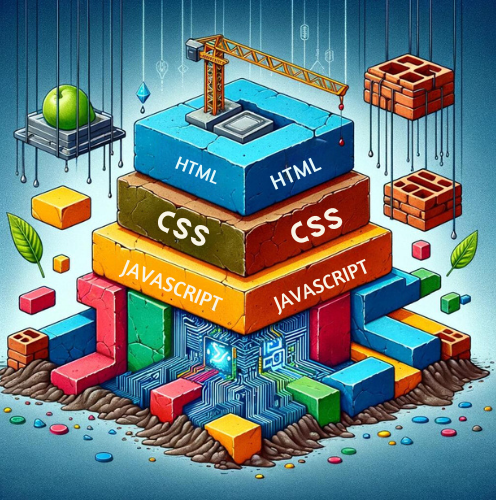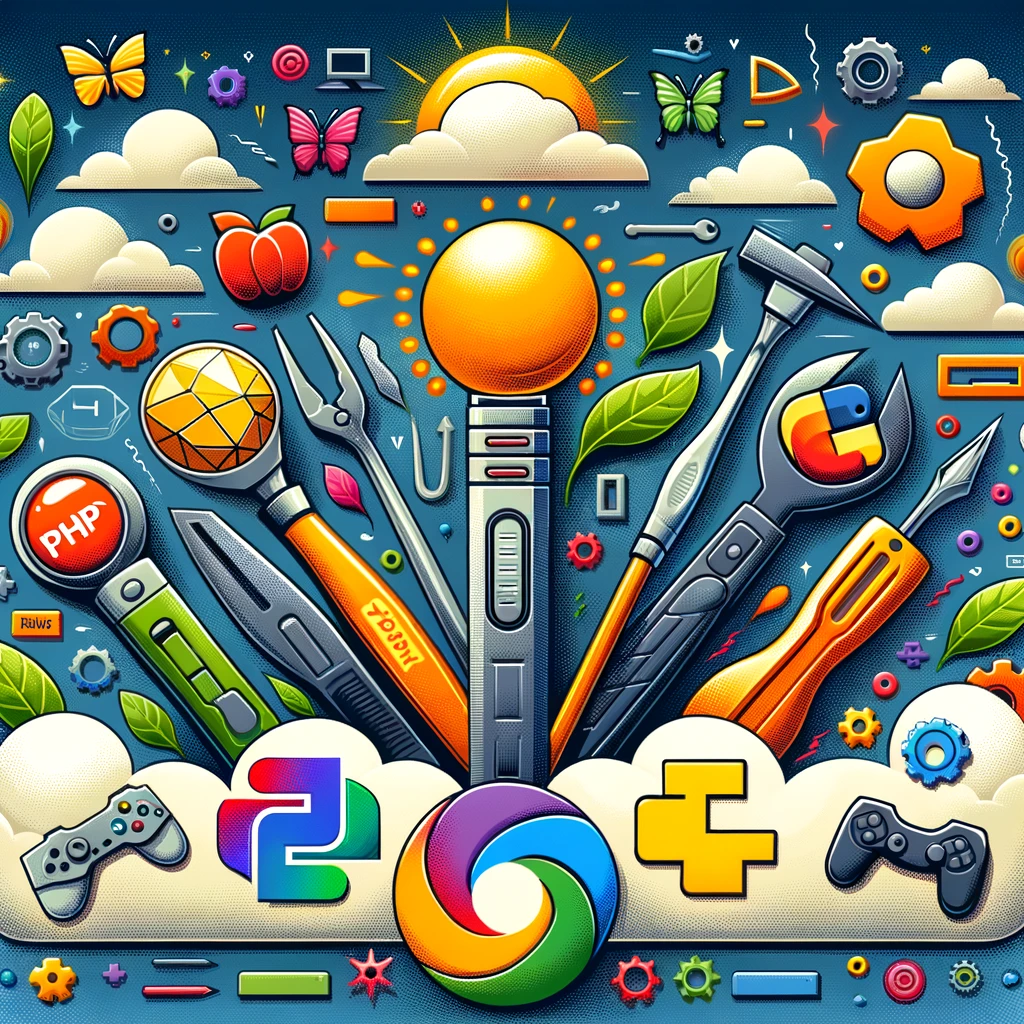Every web developer must these crucial skills in their arsenal, and it all starts with HTML, CSS, and JavaScript. These are the building blocks for creating websites, much like how bricks, cement, and wood frame a house.
HTML and CSS go hand-in-hand; HTML sets the stage with the structure while CSS adds style and personality. Think of HTML as the skeleton of your website, and CSS as the clothing that makes it visually appealing. When using HTML, it is important to be descriptive so that you know the purpose behind what the HTML blocks are doing. This is known as semantic HTML.
JavaScript is then like the electricity that powers the house, bringing life to your website through interactivity and functionality.

For someone just stepping into the vast world of web development, resources like free online courses, interactive platforms, and developer communities offer a treasure trove of knowledge. Places like MDN Web Docs, Codecademy, or freeCodeCamp are fantastic starting points. What’s vital here is not just reading or watching tutorials — it’s about rolling up your sleeves and getting some real coding done.
The journey into web development is exciting. This is a journey where hands-on projects, like building a personal blog or a small business website, accelerate your learning curve exponentially.
But hold your horses, this isn’t just about learning to code; it involves creating websites that can adapt – and that’s where responsive design and Git come into play, topics I’m eager to tell you about some Essential Skills Of A Web Developer.
Navigating the Web with Git and Responsive Design

Git
Git is an essential tool for every web developer. Imagine working on a large project, with all the coding, updating, and multiple developers trying to coordinate. Without a system to manage these changes, it would be chaos. That’s where Git comes in. It lets you track every single change, collaborate without stepping on each other’s toes, and even roll back to earlier versions if something goes awry.
Developers often underestimate the importance of soft skills like adaptability and teamwork. But when you’re working with Git, these skills are just as critical as your technical prowess. In a team setting, everyone needs to be on the same page, and clear communication is key. There are plenty of online resources where you can learn to use Git effectively, from free tutorials to comprehensive courses. And working on open-source projects can give you real-world Git experience.
Responsive Design
You’re going to find out about why it’s non-negotiable in today’s web. With a myriad of devices out there, from smartphones to giant desktop monitors, your websites need to look good and function well across all of them. This skill is at the heart of user-centric web experiences.
Media queries, flexible grids, and responsive images are the tools of the trade. They allow your site to adapt its layout to different screen sizes. Frameworks like Bootstrap can make this task even simpler. Coding with responsiveness in mind from the start prevents many headaches down the road.
Choose something that resonates with you — whether it’s self-study through online courses and tutorials, attending workshops, or earning a degree — but this much is clear: having responsive design in your skillset is not just a plus, it’s expected. And don’t worry too much about mastering everything at once; learning is a continual process, especially in a field as dynamic as web development.
Server-Side Proficiency and the Art of Back-End Development
In my view, a web developer is like an architect and contractor all in one, especially when it comes to back-end development. This is where languages like PHP, Java, Python, Ruby, and C# come into play. Each one of these has its own strengths, and choosing the right one can depend on the project requirements or even personal preference.

Here are the main differences between all of these
- PHP is often favored for its simplicity and speed
- Java boasts robust performance for large-scale applications.
- Python prides itself on readability and efficiency
- Ruby on its elegant syntax
- C# is a go-to for Microsoft-based applications.
Let’s not overlook the role of frameworks; they’re the power tools in a developer’s belt. Frameworks like Django for Python, Ruby on Rails, and ASP.NET for C# can dramatically cut down development time and enforce coding best practices.
I believe that one of the best ways to get started on the back-end is through online courses, coding bootcamps, and open-source projects. By contributing to real projects, you gain practical experience and learn to navigate the complexities of server-side programming.
Do I need to learn all of the languages to be successful? Definitely not. Just pick the language that is right for you and your project.
Design, Optimization, and the User-Centric Web Developer
Design and Optimization in web development are also important skills. It’s not just about making a website look good; it’s also about ensuring that it functions well for everyone who visits it. This is where your UX and UI design skills come into play. Understanding how users interact with websites, and then creating interfaces that are both intuitive and enjoyable, is a huge part of your job.

SEO
SEO isn’t just a buzzword; it’s an essential part of your toolkit as a web developer. You’re going to find out about the nuts and bolts of coding with search engine optimization in mind. Efficient coding, mobile-friendliness, and the proper use of redirects are just the tip of the iceberg. These elements help websites rank higher on search engines, making them more visible to your audience.
Accessibility
In my opinion, one of the most overlooked aspects of web development is accessibility. This isn’t just about doing the right thing; it’s about reaching as wide an audience as possible. By incorporating accessibility guidelines into your design process, you’re ensuring that everyone, including people with disabilities, can use and enjoy your websites.
Content Management Systems
Next up, let’s talk about Content Management Systems, or CMS. If you want to build and manage websites efficiently but don’t have a lot of coding skills, proficiency in platforms like WordPress, Shopify, and Drupal is crucial. These systems are invaluable tools for web developers, particularly when you need to hand over content management to clients who may not be as tech-savvy.
Finally, attention to detail might seem like a no-brainer, but it’s a skill that sets apart great web developers from good ones. Meticulousness in reviewing code, checking user interfaces, and refining user experiences helps to avoid errors and security breaches. With hackers becoming ever more sophisticated, your vigilance is your first line of defense against potential vulnerabilities.
Now, let’s move on and check out how troubleshooting and interpersonal skills become vital in your journey as a web developer.
Troubleshooting and Soft Skills: The Web Developer’s Toolkit
Debugging
Now, what happens when things don’t go quite as planned? That’s where your debugging prowess comes into the picture. Competence in thoroughly testing and identifying gremlins in the code is a hallmark of a skilled developer. Debugging is not just about finding bugs; it’s about adopting a methodical approach to problem-solving, thinking critically, and sometimes having to stand up and go for a walk to refresh your perspective (seriously, it helps).

But technical know-how isn’t the be-all and end-all. Ever needed to explain a complex concept to someone not in your field? That’s a day in the life of a web developer. Clear, effective communication is the bridge between the complex world of code and clients who need to understand what you’re doing and why it matters for their business. It’s not just about what you say, either—it’s how you say it.
Beyond the hard skills like coding and debugging, you’ve got the power skills—the soft skills. They’re what set you apart in the tech world. Employers are after developers who can handle feedback, work as part of a team, and bring a fresh perspective to a challenge. And guess what? These skills can often tip the scales in your favor during a job interview.
I plan to write about soft skills in a future article. Just bookmark and come back to my blog.
For those looking to sharpen both the technical blade and the soft-skill sheath, there’s a plethora of online courses, boot camps, and communities ready to welcome you with open arms. Places like Udemy, Coursera, and freeCodeCamp are fantastic starting points. Also, don’t forget to engage in tech forums and local meetups to network and refine your skills through real-world experience. It’s not just about collecting knowledge, it’s about applying it.
It’s clear that the landscape of web development is a dynamic and expansive one, presenting a bounty of opportunities for those eager to dig into technology and solve puzzles that can have a real impact on people’s lives. There are many paths that the field can open for you.
If you bring curiosity, dedication, and a knack for lifelong learning to the table, you’re already on the path to success in this vibrant field. Remember, your first attempt doesn’t need to be your last, and perfection isn’t the goal—it’s the journey of evolving and adapting that makes a developer truly outstanding.
I have been in the web development industry since 2016. It is my desire to guide aspiring and seasoned developers alike through the complex landscape of web development and software engineering. I combine my academic prowess, with degrees from Western Governor University and a Boot Camp certificate from Bloom Tech, with real-world experience to educate and inspire.
As the force behind DevTuneUp.com, I offer a treasure trove of tutorials, how-tos, and insights into the ever-evolving tech industry. With a sharp focus on demystifying technology and a goal to make DevTuneUp.com a cornerstone for tech enthusiasts, I leverage my expertise in SEO optimization and social media marketing to reach and empower a global audience. Join me on this journey to navigate the digital world with confidence and skill.
I just wanted to say thank you for creating this article for people like me. I found the article to be informative but was wondering if you could elaborate more on the ways in which web developers can continuously learn and adapt to new technologies. Are there specific resources or communities that you recommend for developers to stay up-to-date?
I look forward to reading your response!
Best regards
There are a lot online. I utilize Udemy class for any of these technologies. Free Code Camp is good to but some stuff can be a bit outdated. Its good though for not having to pay.
I’m still new to all of this but the breakdown of css and html and how they work together really helped me visualize it. I’m a mapper, having things I can see and study helps me to remember it. This is really going to help me with my site and learning codes so I can do more with it that the basic. I’m trying to teach myself but it can be overwhelming.
This article has really opened my eyes a lot!! I loved the analogy at the start, comparing the web design to construction, this is where I really got hooked and the rest of the article was so comprehensive but very easy to read, even for someone who isn’t really tech-minded like myself.
I have booked marked this to come back to and check out those sites you mentioned at a later date and give coding a try. Thank you for this!!
Your blog post on the essential skills of a web developer is incredibly informative. I appreciate the breakdown of technical skills like HTML, CSS, and JavaScript, as well as the emphasis on soft skills such as problem-solving and communication. Have you found any particular resources or online courses especially helpful for honing these skills? Personally, I’ve found interactive coding platforms like Codecademy and free tutorials on YouTube to be invaluable in my journey as a web developer.
Additionally, your mention of staying updated with emerging technologies is crucial in such a rapidly evolving field. How do you suggest balancing learning new technologies while maintaining proficiency in foundational skills? It’s a challenge many developers face, and I’m curious to hear your perspective. Overall, your insights provide a solid roadmap for aspiring web developers like myself. Thank you for sharing your expertise!
A thirst for knowledge is key to driving you to learn new technologies via their docs or online learning platforms. I take a lot of Udemy courses.
Hi, I remember back in the day when I wanted to get into python and cyber security. I learned from some vets that they spend a lot of time googling the how too’s. That is there is always something new to learn not to mention like you said teamwork is something that you go outta deal with. Good luck .